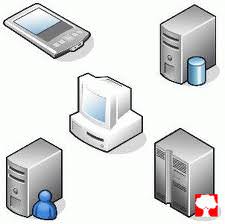What is information technology?
Information technology is the technology used to store, manipulate, distribute or create information. All these can be summed up easily – It’s having knowledge, and knowledge comes from having information. Gaining knowledge through information is the role of ‘’information technology’’ IT in today’s informed world.
IT is a set of tools that can help provide the right people with the right information at the right time. Though IT is not a solution to every thing, for IT to work, people must learn how to use it. So you can not assume that IT will work for you to share information across the organization when people in the organization don’t know how to use it. Below I have listed a few roles of information technology in various sectors.
1. The Role of Information Technology In An Organization:
- Communication: Many organizations take electronic mail ”email” as a basic form of communication among employees, customers, business partners and suppliers. The simplicity of electronic mail ”email” makes it easier and faster to exchange information across departments in an organization. The all process saves time and money. However, more emerging forms of communications have surfaced and they also make communication easier. These include video conferencing systems, Voice over internet telephones ‘‘VIOP’’, live text and video chat services like ”SKYPE” and smart-phones.

- Data Management: There is no need to keep papers about every detail in an organization. Now, organizations have digitized most of their data. This data is stored in a database and employees access and share this information through a decentralized computing system. In a decentralized computing environment, the organization splits computing power and locates it in business areas as well as on the desktop of knowledge workers. So employees and managers can send queries to the database and retrieve data and use it in way required. This saves time and it also improves on decision making with in the organization.
- Management Information Systems: With the use of MIS, data can be accessed and used in a given period of time. MIS reports summarize or aggregate information to support decision-making tasks. So, MIS’s are systems that have information-processing responsibilities that include information through online analytical processing (OLAP) and conveying information to whoever needs it. It is very important for employees and managers to access data anytime for quick decision making.
2. The Role of Information Technology In Banking Industry:
- Remote banking: Now banks have facilities like online banking, ATM’S and mobile banking service which enable perform banking needs at any given time of the day. With a simple user interface, users can use their computers or mobile phones to move money across accounts and they can also get financial details like bank statements and account balance with out going to a physical bank. This process saves time to both the customer and the bank.
- Centralized Information: Banks can operate more than 20 branches in a specific area, but the use of information technology to centralize all the information on all these branches, makes it easy to access information both by the bank employees and the customer.
- Credit cards or smart cards: Now banks issue out plastic cards to their customers so that they can perform transaction anytime anywhere. For example , customers can buy any thing without carrying cash money, but they will use a smart card like ‘’VISA ELECTRON’’ to pay for products either online or at the shopping center.
3. The Role of Information Technology In Student’s Life:
- Easy access to educational material: Today , students can access books and research notes online. Unlike in the past when a student had to borrow a book from a physical library for a specific period, now days they can access most this data inform of e-books or electronic libraries. Library mobile Apps have been developed to enable students get library material on their mobile phones. Gadgets like Ipad , Amazon Kindle book reader have simplified students life.
- Ability to study from anywhere: Online education has unlocked many boundaries for students. A student can now study from any were and work from any where. For example, accounting courses like ACCA can be done online and students who qualify can work from anywhere, this increases on their chances of competing for high qualified jobs in developed markets around the world .
More areas have been impacted by information technology, these include society, workplace , government, agriculture , entertainment and many more. You can discuss more about this topic using the commenting functionality below
















